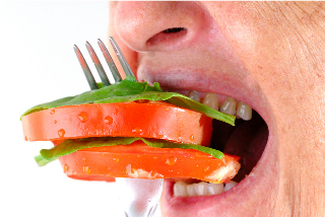
Do You Suck At Chewing?
June 28, 2015 // Nutrition
Everyone masticates. We all take pleasure and pride in chewing our foods. However, it’s apparent that chewing strength may differ from person to person, thus affecting which foods we choose.
The act of chewing plays a critical role in proper digestion. Chewing provides us with a chance to prepare our stomach and GI tract for the incoming food. As you’re about to munch on your next bite, your body is already releasing digestives enzymes to help aid in the breakdown of your food. These processes, and others, contribute into the highly complex world of food digestion.
Chewing strength, or lack thereof, can provide valuable insight into why you may choose foods that don’t fall in line with the “healthy choices”.
If you have good chewing strength, you are more likely to opt for salads, veggies, and other choices that take more time to chew and process.
However, if you have a weak chewing ability, chances are the foods you eat often don’t require much effort from your jaw. For example, foods like cookies, fries, pasta, etc. are naturally soft and easy to eat. The problem with soft food like this is that the high amount of calories in each bite gets absorbed while your jaw isn’t doing much work. It’s very easy to eat 500+ calories of processed food(s).
A study with the American Journal of Clinical Nutrition found that chewing food 40 times, instead of the typical 15 bites, caused participants to eat over 10% less calories.
Strategies For Better Chewing Habits
1. Be sure to chew more slowly. Slower chewing has a direct correlation with satiation and improved enjoyment of one’s meals. By slowing down, you’ll take more time to assess the flavors of each bite, thus providing improved satisfaction with less quantity of the food.
2. Set aside extra time for meals.
When you rush through a meal or snack, you’re setting yourself up for problems. Rushed eating disconnects the individual from the food they are consuming. Set aside an extra 5-10 minutes for a slower, more enjoyable eating experience.
3. Choose foods that require more effort to consume.
Eating salads before dinner or fruit during the day will provide you with plenty of vitamins and minerals, as well as fiber to keep you full. Foods with a more challenging texture, such as broccoli, cabbage, and asparagus, will teach you to slow down and spend more time tasting each bite.
Improving your chewing abilities can greatly improve your approach to eating a meal, which directly affects how your body stores your body fat. Slow down, taste the flavors, and enjoy your meals again.